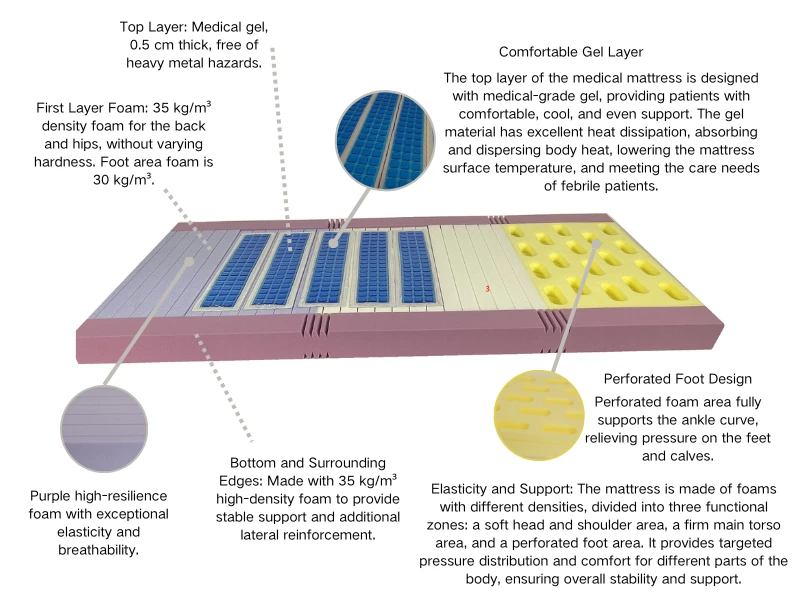Air Mattresses for Pressure Relief and Preventing Bedsores
The Importance of Anti-Decubitus Air Mattresses in Healthcare
In the healthcare sector, the prevention of pressure ulcers, commonly known as bedsores, is a critical concern, especially for patients with limited mobility. One of the most effective tools in combating this issue is the anti-decubitus air mattress. These specially designed mattresses provide essential support and comfort for individuals at risk of developing pressure sores and have become a staple in hospitals, nursing homes, and home care settings.
Understanding Pressure Ulcers
Pressure ulcers occur when there is prolonged pressure on the skin, particularly over bony areas, leading to tissue damage. Individuals who are bedridden, elderly, or have conditions that limit mobility are particularly vulnerable. According to the National Pressure Ulcer Advisory Panel, the consequences of pressure ulcers include not only significant physical harm but also increased healthcare costs and a longer recovery time, which can drastically affect the quality of life.
What is an Anti-Decubitus Air Mattress?
An anti-decubitus air mattress is designed to alleviate pressure points and improve blood circulation, thereby reducing the risk of pressure ulcers. The mattress features a series of air cells that can be inflated or deflated to distribute weight evenly across the surface. This dynamic adjustment ensures that no single area of the body bears too much pressure for an extended period. Many models come with additional features such as adjustable firmness levels and heating elements to enhance patient comfort further.
Benefits of Anti-Decubitus Air Mattresses
1. Pressure Redistribution The primary benefit of these mattresses is their ability to redistribute body pressure, helping to prevent the formation of bedsores. By continuously adjusting the air pressure in various cells, the mattress reduces the duration and intensity of pressure applied to any single area.
anti-decubitus air mattress products

2. Enhanced Comfort Patients often experience greater comfort when using air mattresses as they conform to body shapes and movements. This adaptability can promote relaxation and improve sleep quality, both of which are vital for overall health and healing.
3. Mobility Assistance Some anti-decubitus mattresses are equipped with features that assist in patient mobility. For instance, they may include a slight inclining capability that helps patients change position more easily, further reducing pressure and improving circulation.
4. Ease of Maintenance Most air mattresses are designed for easy cleaning and maintenance, an important factor in hospital and nursing home settings where hygiene is paramount. Removable covers typically allow for washing and disinfection, thus contributing to infection control.
5. Cost-Effectiveness While the initial investment may be higher than traditional mattresses, the long-term benefits of preventing pressure ulcers can lead to significant cost savings. Treating pressure ulcers can be both complicated and expensive, so proactive prevention is cost-effective in the long run.
Choosing the Right Anti-Decubitus Air Mattress
When selecting an anti-decubitus air mattress, it's essential to consider factors such as the patient's specific medical conditions, weight distribution, and mobility level. Consulting with healthcare professionals can provide valuable insights into the most suitable options available in the market.
Conclusion
Anti-decubitus air mattresses are a transformative solution in the prevention and management of pressure ulcers within healthcare settings. By providing superior support, improving comfort, and facilitating mobility, these mattresses play a crucial role in enhancing the quality of life for at-risk patients. As technology advances, the features and effectiveness of these mattresses continue to improve, ensuring that healthcare providers have the best tools at their disposal to protect vulnerable individuals from the debilitating effects of pressure sores. Investing in such quality products is not just an option; it is a commitment to patient care and well-being.
-
The Effect of Coconut Foam Mattress Breathability and Humidity Regulation on Improving Sleep QualityNewsJul.03,2025
-
How Wave Mattress Systems Improve Blood Circulation During ImmobilityNewsJul.03,2025
-
The Climate-Adaptive Sleep Revolution: Exploring the Benefits of Cooling Gel Memory Foam MattressesNewsJul.03,2025
-
Exploration of the Role of Coconut Foam Mattress in Preventing Bedsores in the ElderlyNewsJul.03,2025
-
Comparing Wave Mattress and Air Mattress: Which Is Better for Medical Use?NewsJul.03,2025
-
Analysis of Comfort and Environmental Performance of Natural Latex and Coconut Foam MattressNewsJul.03,2025
-
Multi-Layer Construction for Enhanced Performance in Gel Mattress PadNewsJun.24,2025

